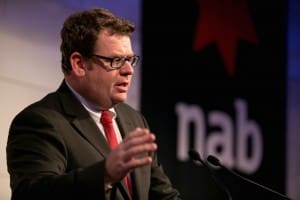THERE is a lot to consider when a sheep and wool sector business needs new equipment to make their operation more productive.
New or second-hand? Which brand is best? What about re-sale? Among the most important is the best way to finance the purchase.
NAB Agribusiness general manager Khan Horne says his bank is seeing a lot interest from customers looking to upgrade at least some of their equipment, and he urges producers to carefully consider all options available to finance those purchases.
“We’ve seen a growing need to provide ever more tailored products for farmers to meet their individual circumstances, given the cyclical nature of cashflow,” Mr Horne said.
“If you make most of your sales in summer, you should be able to make most of your repayments at this time, and have the repayments for the rest of the year adjusted accordingly.”
“You also shouldn’t have to pay a deposit on your new purchase,” he said.
Equipment finance offerings by banks are becoming more flexible, and matching repayments to periods of higher cashflow is a smart way to get the equipment that a sheep or wool business needs.
Mr Horne said there was more than one way to finance new equipment, and outright purchase was not always the best way to use the capital at hand.
“Generally, it is good business practice to have a balanced mix of debt and equity and it’s important to consider all your options. A finance lease or hire purchase can also be used to fund equipment needs,” he said.
There are several tax implications to consider where new plant and equipment produce assessable income and it’s important to seek independent advice from your accountant or financial adviser.
For example, a finance lease can help a business budget with greater certainty. The bank purchases the equipment and rents it to the business for an agreed period at a fixed rental rate. At the end of the term, the leaser has the option to return the equipment to the bank, apply to refinance the equipment, or make an offer to purchase it outright.
“Hire purchase is a useful option if a producer would eventually like to own the equipment,” Mr Horne said. “It is similar to a finance lease, although at the end of the finance period, the business owns the equipment.”
“Buying new plant and equipment can be expensive and it’s important to remember there are a number of ways to finance purchases. As with all important business decisions it’s a good idea to get expert advice and investigate what will work best for your situation,” he said.
- NAB Agribusiness has leasing specialists who can work with producers, their financial advisers and their local Agribusiness manager to help structure a facility that best suits each individual’s needs.


HAVE YOUR SAY